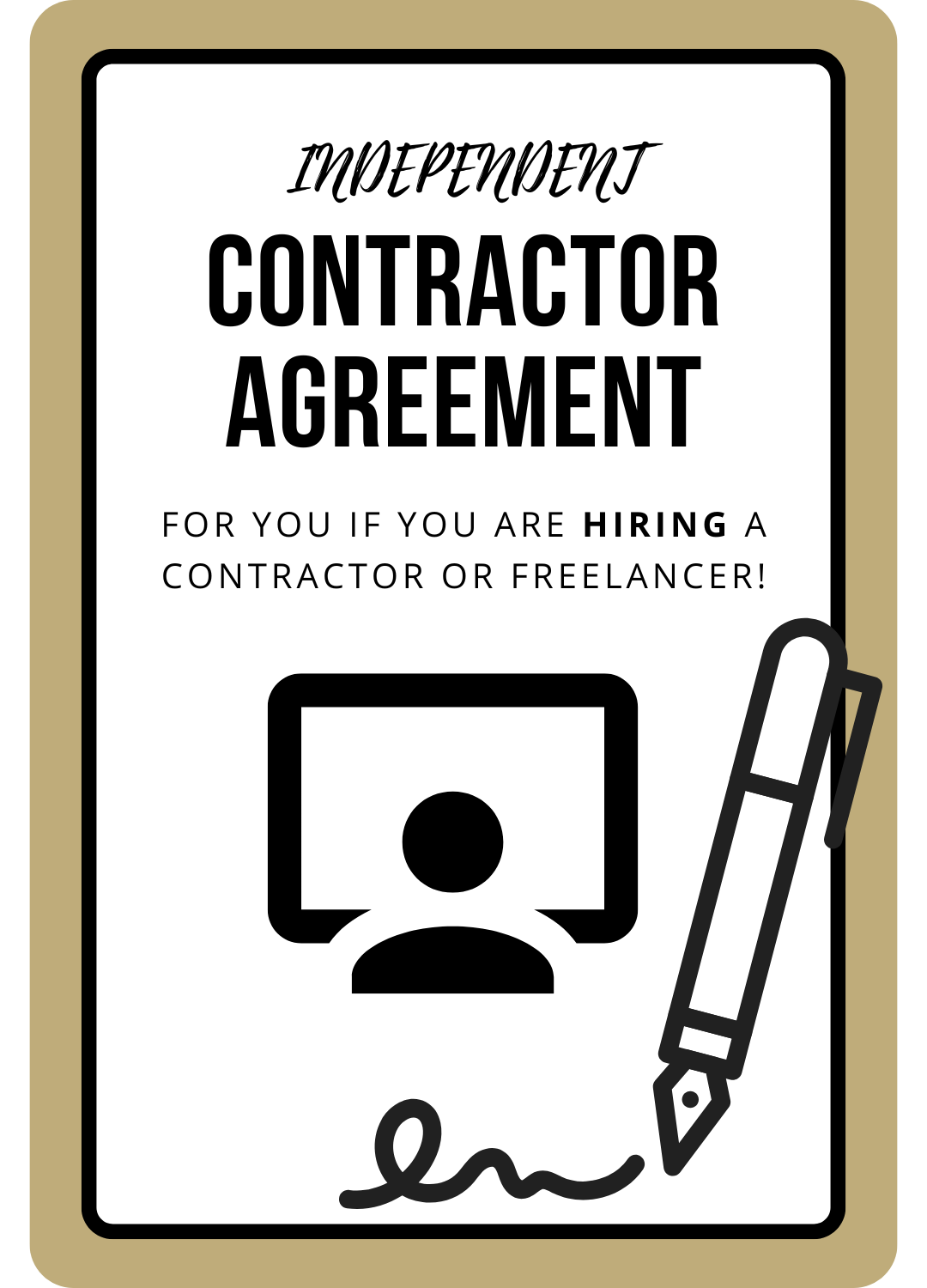10 Must-Haves for All Work for Hire Agreements (So You Own the Work You’re Paying For)
Hiring people to create work for your business without strong work for hire agreements is like paying for a house and letting the builder keep the keys.
Whether you’re working with a designer, VA, photographer, social media manager, copywriter, or software developer, proper work for hire agreements are the only way to make sure you — not they — own the content, designs, code, or campaigns you’re paying for.
As a business lawyer who drafts work for hire agreements for business owners and entrepreneurs like you, I’ve seen the headaches that come from skipping key clauses — from ownership disputes to content takedown demands months (or years) later.
That’s exactly why I created my Work for Hire Agreement Template (for Hiring) — so you can secure ownership of everything with fluff free work for hire agreements without hiring a lawyer for custom work.
In this post, I’ll walk you through 10 must-have clauses for all work for hire agreements (including practical work for hire examples), so you can protect your rights, avoid disputes, and keep full control of the work you’ve paid for — whether you’re hiring a creative or any independent contractor.
This post is all about the essential terms all work for hire agreements must have to protect your business and own the work you’re paying for.
Best Work for Hire Agreements
The 10 Must-Have Terms for Your Fluff Free Work for Hire Agreements
1. Scope of Work
The scope of work is the blueprint for your project — and in work for hire agreements, it’s not just about what’s included, but also about how flexible it can be.
The problem: Many work for hire agreements either define the scope too vaguely (leading to disputes over what’s included) or too narrowly (making it a headache to add extra work later). Both can cost you time, money, and ownership clarity.
Example: You hire a VA to manage your email newsletter. The contract says “email marketing,” but doesn’t specify the number of emails, frequency, or whether list-cleaning is included. When you ask for a quarterly re-engagement campaign, they claim it’s “out of scope” and demand a separate contract.
The solution: Define the scope clearly enough that there’s no question about what’s covered now — but also keep it broad enough to allow for future adjustments without renegotiating from scratch.
My Work for Hire Agreement Template goes a step further: it includes a clause giving you the unilateral right to amend the scope (including adding tasks or deliverables) at your discretion, without paying extra unless you choose to. More about this in #10!
That way, you stay in control, and the project can adapt to your needs as they evolve.
💡 Want this built-in flexibility without sacrificing clarity? My Work for Hire Agreement Template (for Hiring) includes a done-for-you scope of work + amendment clause you can customize in minutes.
2. Ownership
This clause in work for hire agreements determines who owns the work — and without the right wording, you might end up with less than you think.
The problem: Even agreements with a standard IP transfer often limit ownership to the “final deliverables.” That means drafts, preparatory work, or raw files could legally remain with the contractor — giving them leverage to charge extra if you ever need them.
Example: You hire a graphic designer for a rebrand. The contract transfers ownership of the final logo, but not the editable source files or early concepts. A year later, you want to update the design, but the designer insists you pay an additional licensing fee to use the old, editable drafts.
The solution: Make sure ownership covers everything — the final product, all drafts, preparatory materials, derivative works, and related IP. My template goes even further by:
Assigning all intellectual property rights to you from the moment they’re created.
Including a moral rights waiver, so you can modify or adapt the work without needing the creator’s permission.
Covering all formats and media, now and in the future.
💡 My Work for Hire Agreement Template is written so you don’t just “own the final work” — you own everything that went into creating it.
3. Explicit Assignment
Even if your contract says the work is “yours,” the law often requires an explicit assignment of rights to make that transfer legally airtight. Without it, you could be stuck with a clause that sounds protective but isn’t enforceable in practice.
The problem: Many work for hire agreements simply state that the client “will own the work” without actually documenting the legal assignment from the creator to you. In some jurisdictions, that wording isn’t enough — meaning the creator could still hold residual rights, especially if they worked with subcontractors.
Example: You hire a copywriter to create website copy. Your contract says you “own” the content, but when you later discover sections were written by their subcontractor, you have no proof the subcontractor assigned their rights to you. The subcontractor then demands removal unless you pay a separate fee.
The solution: Your work for hire agreements should include:
An immediate, irrevocable assignment of all intellectual property rights to you.
A requirement that the contractor secures the same assignment from any subcontractors or team members they use.
A clause obligating the contractor to take any further action needed (even after the project ends) to perfect and enforce your rights.
💡 My Work for Hire Agreement Template includes this exact wording — plus the subcontractor protection — so you’re covered from every angle, no matter who actually touches the work.
4. Moral Rights Waiver
Even if you fully own the intellectual property, the creator might still hold moral rights — personal rights that allow them to object to how their work is used or modified. If your work for hire agreements don’t address this, those rights can seriously limit your creative control.
The problem: In many countries, moral rights can’t be transferred, only waived. Without a waiver, a contractor could demand that you credit them in a certain way, block you from making edits, or even object to the work being used in contexts they don’t like.
Example: You hire a videographer for a brand promo. You later edit the footage to fit a new campaign. The videographer claims the changes “damage their artistic integrity” and demands the edited version be removed. Without a moral rights waiver, they could have the legal ground to force you to comply.
The solution: Include a broad, irrevocable waiver of moral rights in your work for hire agreements. This gives you the unrestricted right to use, adapt, modify, and even remove the creator’s name from the work if you choose. My template also lets you authorize future owners of your business to use the work without needing to track down the original creator for permission.
💡 The Work for Hire Agreement Template includes a bulletproof moral rights waiver, so you — and only you — decide how your work is presented, credited, and adapted.
5. Warranties
When you pay for work, you expect it to be original — but without solid warranties in your work for hire agreements, you could be unknowingly buying stolen, infringing, or AI-generated content that lands you in legal trouble.
The problem: If a contractor copies someone else’s work or uses AI tools without proper rights, you could be held liable as the owner. This can lead to copyright infringement claims, reputational damage, and costly takedown demands — even if you had no idea the work wasn’t original.
Example: You hire a freelance illustrator for a marketing campaign. Months later, a stock image company claims one of your illustrations is a modified version of their licensed artwork. Because your contract didn’t require the illustrator to guarantee originality and indemnify you, you’re on the hook for damages and legal fees. Unfortunately, there are a lot of work for hire examples like this one.
The solution: Require your contractor to warrant that all work is original, does not infringe third-party rights, and that they have the authority to transfer full ownership to you.
My Work for Hire Agreement Template takes it a step further by banning the use of AI-generated work (like text, images, or code) unless you approve it in writing — protecting you from unpredictable licensing and copyright issues.
My template also includes a full indemnity clause, so if a claim does arise, the contractor is responsible for handling it and covering your losses.
💡 My Work for Hire Agreement Template includes watertight warranties, an AI-use restriction, and an indemnity — so you get genuine, rights-clear work every time.
6. Compensation
Payment terms in work for hire agreements aren’t just about how much you pay — they’re about what your payment actually covers. In a work for hire contract, this is crucial for avoiding surprise fees tied to intellectual property rights.
The problem: Many work for hire agreements treat the creative work fee and the transfer of ownership as separate transactions. That means a contractor could agree to create the work for a set price, but later demand an additional “licensing” or “transfer” fee before you can fully use or own it.
Example: You hire a social media manager to create branded content. You pay their invoice in full, only to find they expect an additional $500 “content rights” fee before they’ll release the raw files and legal ownership. Without clear contract language, you may have no choice but to pay.
The solution: Your agreement should state that the agreed fee includes full ownership transfer — covering all IP rights, drafts, and preparatory materials — and that no additional payment is due for this transfer.
💡 The Work for Hire Agreement Template makes it clear: your payment covers the work, the IP rights, and every file connected to the project — no hidden “ownership” upcharges later.
7. Confidentiality
Hiring a contractor often means giving them inside access to your business — from marketing plans and client lists to product launch details. Without a strong confidentiality clause in your work for hire agreements, you risk that information leaking to competitors, being reused for other clients, or even being made public.
The problem: Many confidentiality clauses are vague, short-term, or only apply during the project. This leaves a gap where a contractor can legally use your sensitive information after the contract ends, or claim they didn’t realize something was “confidential.”
Example: You hire a VA to manage your client onboarding. They also work for another business in your niche. Without clear restrictions, they reuse your onboarding materials for the other client, arguing they were “industry standard” and not confidential.
The solution: Your work for hire copyright agreement template should define exactly what counts as confidential information (including business processes, strategies, and client details), restrict its use to your project only, and require the contractor to either return or destroy all confidential materials at the end of the contract. My template also makes this obligation last for three years after the project ends, giving you long-term protection.
💡 The Work for Hire Agreement Template includes a comprehensive, time-bound confidentiality clause so your business secrets stay yours — during and long after the project.
8. Termination
Even with the best planning, sometimes a project needs to end early. Without the right termination rights in your work for hire agreements, you could be stuck paying for work you don’t want — or scrambling to transition the project to someone else.
The problem: Many work for hire agreements make termination either overly complicated or only possible for “serious breaches.” That means you can’t exit easily if timelines slip, the quality isn’t there, or the working relationship simply isn’t a fit. Worse, there’s often no requirement for the contractor to hand over materials so another person can finish the job.
Example: You hire a virtual assistant for ongoing monthly work. After two months, they’re missing deadlines and not following instructions. Your contract doesn’t allow you to terminate without giving 60 days’ notice, so you’re stuck paying for subpar work for two more months — and losing time on tasks you urgently need done.
The solution: Your contract should let you end the project at your discretion with a short notice period, while clearly stating what happens upon termination — including the immediate handover of all materials, files, and information so the next contractor can seamlessly pick up the work. My template even lists specific situations where you can terminate immediately without paying for uncompleted work (like missed deadlines, reputational risk, or integrity issues).
💡 The Work for Hire Agreement Template puts you in control with flexible, clear termination rights — and ensures you keep everything you’ve paid for.
9. Allocation of Damages
Even with warranties and ownership clauses in place, there’s still a chance that a contractor’s work could infringe on someone else’s rights or cause financial loss. If that happens, you need to make sure they, not you, are financially responsible.
The problem: Without an indemnity clause in your work for hire agreements, you could end up paying legal fees, settlements, or damages for something entirely outside your control. And while some agreements include indemnities, they’re often watered down and useless in practice.
Example: You hire a developer to build custom software. A few months after launch, a competitor claims the code was copied from their proprietary system. Even though you had no knowledge of it, without a strong indemnity, you’re on the hook for defending the claim and covering any settlement costs.
The solution: Include a broad indemnity clause in your work for hire agreements that requires the contractor to cover all losses, claims, and legal costs arising from their work — even if the infringement was unintentional. My template also ensures this protection covers subcontractors and applies after the contract ends, so you’re shielded from “surprise” claims down the road.
💡 The Work for Hire Agreement Template includes a comprehensive indemnity clause, giving you the confidence that if a problem arises, the financial risk is on the contractor — not you.
10. Flexibility to Amend the Scope Without a New Contract
Projects evolve — sometimes faster than expected. If your contract locks the scope of work in stone, every small change can turn into a new round of paperwork, negotiations, and potential delays.
The problem: Most work for hire agreements require a formal contract amendment (or even a brand-new agreement) for any additional work. That’s slow, inconvenient, and can give contractors the leverage to renegotiate pricing every time you need something extra.
Example: You hire a content creator for blog posts, and halfway through the project, you want them to also create a short video series. Your contract doesn’t allow scope changes without a formal amendment — so now you’re stuck in a back-and-forth over a new contract before any video work can start.
The solution: Build flexibility into your contract from the start. My template gives you the unilateral right to amend the assignment — meaning you can add or adjust tasks and deliverables without renegotiating or drafting a new contract each time. You stay agile, the work keeps moving, and you avoid unnecessary legal admin.
💡 With the Work for Hire Agreement Template, you can adapt projects on the fly while keeping full control over the budget, timeline, and deliverables.
The Ultimate Work for Hire Copyright Agreement Template
Protecting your ownership rights isn’t just about having a contract — it’s about having the right work for hire contract, with clauses that cover every angle. From clearly defining and flexibly amending the scope of work to securing full ownership (including drafts), waiving moral rights, locking in originality guarantees, and shifting financial risk where it belongs, these clauses give you control, clarity, and peace of mind.
Without them, you risk paying for work you can’t fully use, getting hit with surprise fees, or facing legal disputes you never saw coming.
Why leave those risks on the table when you can have a ready-to-use agreement that already includes all 10 must-haves?
💡 My Work for Hire Agreement Template (for Hiring) is designed so you:
Own everything from day one — final deliverables, drafts, and all related IP.
Stay in control with flexible scope changes and clear termination rights.
Avoid disputes with airtight warranties, indemnities, and confidentiality protections.
Save time by skipping custom drafting (but still getting lawyer-level protection).
Get the contract that keeps your business protected and your projects moving — without the headaches.
➡ Get the Work for Hire Agreement Template now and protect every word, design, and idea you’re paying for.
This post was all about the crucial terms all work for hire agreements must include to protect your rights, avoid disputes, and keep full control of the work you’ve paid for.
Other posts you may like:





